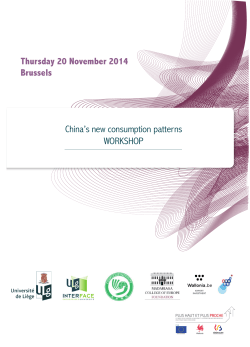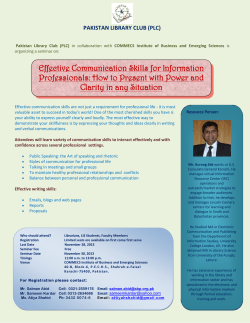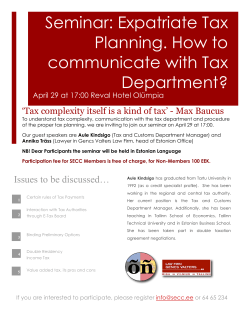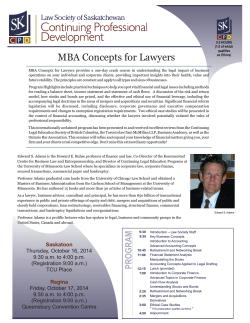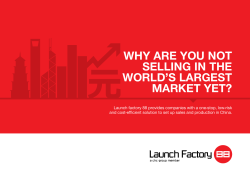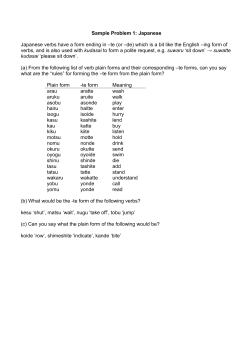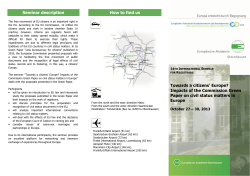
Professor Paul U. Unschuld Seminar Series Sydney | Melbourne | Brisbane Australia
Professor Paul U. Unschuld Seminar Series Sydney | Melbourne | Brisbane Australia November 2014 Lecture: The Three Conceptual Turning Points in the History of Chinese Medicine (In affiliation with University of Technology, Sydney) Seminar A: Philological and Historical Approaches to Classical Chinese Medicine Texts: Lectures on Huang Di Nei Jing Su Wen, Huang Di Nei Jing Ling Shu & Nan Jing Seminar B: Ethics/Professional Issues: • Medical Ethics in the history of Chinese Medicine • The Integration of Alternative/Complementary Paths of Health Care Into a Modern Health Care Delivery System – The Case of TCM Sydney: To register straight away, please go to: Thursday 6th November 2014 (UTS Evening Lecture-Sydney Only) Practitioners: www.qiology.com.au/registration.php Friday 14th November 2014 (Seminar A) Students: www.qiology.com.au/student.php For more information, please go to: Saturday 15th November 2014 (Seminar B-Ethics/Professional Issues) www.qiology.com.au/latest-seminar.php Melbourne: Email: info@qiology.com.au | Mobile: +61 405 044 576 Sunday 16th November 2014 (Seminar A) Monday 17th November 2014 (Seminar B-Ethics/Professional Issues) Brisbane: Tuesday 18th November 2014 (Seminar A) Wednesday 19th November 2014 (Seminar B-Ethics/Professional Issues) Brought to you by The man who assisted a generation of Chinese Medicine Practitioners in the West, to tap into the source of our tradition.... In November 2014, Qiology has invited world renowned philologist, sinologist, scholar, historian and translator in the field of Chinese Medicine, Professor Paul U. Unschuld, to conduct a multi-seminar series in Sydney, Melbourne & Brisbane, Australia. This is the second time in 30 years that Professor Unschuld has taught within Australia, and most likely his final teaching trip to Australia prior to his retirement in alignment with the completion of Professor Unschuld’s final translation project: The Huang Di Nei Jing Ling Shu. This is a unique opportunity to learn from the man who inspired so many through his benchmark translations of Classical Chinese Medicine texts. The varied seminar/ lecture topics allow those with interests in particular areas to meet their educational needs, including the sphere of Ethics/Professional Issues (Seminar B). Those with a keen interest in Chinese Medicine History or Chinese Medicine Classical Texts will benefit from attending Seminar A, or the UTS Evening Lecture. Each event will be delivered in Professor Unschuld’s insightful and engaging style, which has set him apart as a sought-after presenter across the globe. "Prof. Unschuld is considered as the most influential authority in Chinese Medicine text translation, ancient and modern. His work has provided inspiration for my Chinese Medicine practice, and enabled myself and other practitioners a depth of understanding that would not be possible for the Chinese Medicine practitioners of the Western world who do not possess his linguistic skills. A must see inspirational seminar series..." -Mark Phillips, Senior Acupuncturist/Chinese Medicine Practitioner - Sydney, Australia. Professor Paul Ulrich Unschuld Born in 1943 in Lauban, in the Prussian province of Silesia, Germany, Professor Unschuld studied Chinese Language whilst undergoing a degree at the School of Pharmacy at the Munich University. Graduating in 1968 with a keen interest in international relations, Paul and his wife applied for a grant to visit Taiwan to further their Chinese language skills. Whilst in Taiwan, research originally in medical and pharmaceutical fields led to research into traditional Chinese medicines, which further grew into intense research in all aspects of Chinese medicine, and Chinese medical history, leading to Unschuld’s text- Medicine in China: A History of Ideas. Professor Unschuld now holds degrees in Chinese Studies, Pharmacology, public health, and political science from some of the world’s most prestigious universities, and is currently Professor and Director of Horst-Goertz-Institute for the Theory, History and Ethics of Chinese Life Sciences, Charité-Medical University, Berlin. Unschuld has authored many papers on Chinese medicine, and is famous for authoring many texts that are highly regarded in the Chinese medicine field to this day, including many scholarly translations of Classical Chinese Medicine Texts. His latest translation project, due to be finished in 2014 is the Huang Di Nei Jing Ling Shu. A text highly anticipated by Chinese Medicine practitioners worldwide. Seminar Curriculum Details Seminar A: Philological and Historical Approaches to Classical Chinese Medicine Texts: Lectures on Huang Di Nei Jing Su Wen, Huang Di Nei Jing Ling Shu & Nan Jing "Here is a source from two millennia ago.... Only if we approach it by means of philological and historical methods, practitioners will be able to decide what can be used in today's response to illness." -Prof. Paul U. Unschuld Professor Unschuld will lecture on the following topics, which include some ‘ground-breaking’ new interpretations of Classical Chinese Medicine literature, plus a Q + A section at the end of the day: • The Earliest Literary Sources of Chinese Medicine. The Huang Di Nei Jing Texts and the Nan Jing: Common ground & differences • Cultural and Political Significance of Chinese Medicine Based on a Secular Natural Science • Ancient Greece and ancient China – the two cradles of secular medical sciences • The new interpretation of “fate” (ming), “model” (fa), and “spirit” (shen) • A new vision of the human body and its interaction with its natural environment • The discovery of disease as opposed to symptoms • Early acupuncture: bloodletting and Qi regulation combined Which practitioners and students will benefit by attending this seminar? • Practitioners who utilize study of Classical Chinese Medicine texts to inform their clinical practice, who wish to deepen understanding • Practitioners and students with a keen interest in the historical aspects of our Medicine • Practitioners who identify with the “Scholar-Physician” and wish to enhance their abilities in Classical Text studies • Practitioners and students who wish to inform their practice through broadening their understanding of Chinese Medicine by utilizing historical and philological methods Seminar B: Ethics/Professional Issues: This Ethics and Professional issues seminar, based on Professor Unschuld’s vast knowledge on political, ethical, and historical viewpoints in Chinese medicine, past and present, and his expertise in public health and political sciences, focuses on two main areas of interest, that may enhance our understanding of our profession in modern times: - Medical Ethics in the history of Chinese Medicine The clinical practice of health care experts has been documented in Chinese historical sources since the 1st c. BCE. Over the past two millennia, the diversity of health care and therapeutic approaches developed in China resulted in a heterogeneous array of practitioners competing for public confidence. Patients requiring expert medical assistance had a choice of turning to physicians who based their therapies on secular science explanatory models exclusively, or to resort to practitioners relying on religious explanatory models. Still others applied whatever concepts and practices they thought appropriate regardless of their theoretical background. No standard education or licensing system to cover and regulate medical practice existed in pre-20th century China. Practitioners may have been taught by famous doctors, or within a family tradition. They may have set out to study medical literature on their own, or they were simply imposters who claim to be competent while in fact they meant to cheat their customers. Beginning with the 11th/12th centuries, pharmacists played a dominant role. They hired physicians to see patients on their premises, which resulted in a commercial profit orientation of medical practice largely characterizing the health care system in China to this day. Confucian political philosophers recognized the value of medicine in general but failed to appreciate the value of professional medical practitioners. They preferred to see every filial son sufficiently versed in health care skills to help parents and other family members when necessary. Physicians practicing medicine for their livelihood contradicted this attitude and voiced their requests for recognition of medical expertise that could result from professional practice only. The interaction between these positions is documented in Chinese sources from the 8th/9th centuries (Tang dynasty) on. The ethical creeds and complaints published over the past 1300 years permit fascinating insights into a social struggle to never lead to a degree of medical professionalism known in Europe and the Western world. Countless further sources offer an insight into the reality of medical ethics. Handwritten manuals of practitioners include advice that for fear of reprisals never appeared in printed literature. Thus, the widespread practice of abortion is not apparent from printed medical literature, and the many techniques applied by itinerant healers to conceive their clients are equally documented in private notebooks only. This lecture provides an overview of the manifold interest and dynamics in Chinese medical ethics over the past two millennia and invites to reflect on the social position of medicine and professional boundaries, as well as on the limits of profit seeking in medical care in today’s world. - The Integration of Alternative/Complementary Paths of Health Care Into a Modern Health Care Delivery System – The Case of TCM It is common knowledge that so-called Western medicine, or biomedicine, is not in a position to successfully respond to all challenges of human disease. It is equally common knowledge that alternative/complementary ways of health care are to be tolerated, if not supported, in a modern health care delivery system to close the many gaps left by modern biomedicine. Each country has developed its own approach towards permitting a parallel existence of modern biomedical and alternative/complementary approaches. Still a gold standard may not have been found anywhere. Hence there is a continuing need to discuss the potential and also the problems associated with the creation of an integrated health care delivery system. TCM is an exemplary case in point. This session is to help attendees recognize the most pertinent issues faced by health care experts and politicians in their attempts at generating a structure that permits patients to consult with whichever diagnostic and therapeutic approach they prefer, and at the same time to allow the government to fulfill its most important political ends, that is, that is to protect its citizens from harm. Such harm may be physical or even mental if practitioners are permitted to conduct therapies they are not qualified for, or it may be financially or otherwise detrimental in that imposters claim abilities and are paid for services that do not hold what they promise. The political ideal of allowing for therapeutic freedom while at the same time protecting the people from harm and fraud is to be discussed here with an eye at TCM. Questions raised will focus on requirements of standard training and licensing vs. freedom of acquisition of expertise, on payment structures by mandatory and voluntary insurance models, on the need to scientifically legitimize diagnosis and therapy vs. permitting all types of approaches, by the scientifically legitimated or not, to be advertised and practiced, and others more. (Ethics/Professional Issues CPD Points Applicable) Which practitioners and students will benefit by attending this seminar? • Practitioners with a keen interest in the history of ethics in Chinese Medicine • Practitioners wishing to learn more about the benefits of, and barriers to integration of Chinese Medicine into the modern health care system • Students who wish to gain a deeper understanding of topics that will shape their future ethical practice, and that will shape the future of our profession in general • Practitioners wishing to complete their yearly Ethics/Professional Issues CPD hours, whist learning from a world-class presenter. Lecture: The Three Conceptual Turning Points in the History of Chinese Medicine (In affiliation with University of Technology, Sydney) The history of Chinese Medicine, very much like the history of European medicine and in the course of nearly identical time intervals, has been shaped by three conceptual turning points. An understanding of these turning points is essential not only for today’s historians of medicine and science with an interest in comparing the only two traditions of medicine traceable from their very conceptual beginnings to the present. An awareness of the three conceptual turning points is equally essential for clinicians with an interest in a practical application of ancient Chinese pathological and physiological theories and therapeutic approaches. Which practitioners and students will benefit by attending this lecture? • Practitioners and students who wish to gain a deeper understanding of the historical events that significantly influenced Chinese Medicine. • Practitioners and students with a keen interest in the historical aspects of our medicine. • Practitioners and students who are not able to attend the seminars, yet who are still wishing to see a lecturer who is a significant contributor to the worldwide Chinese medicine profession. Seminar & Lecture Attendance Details Seminar/Lecture Attendance Details: Professor Paul U. Unschuld Seminar Series Sydney | Melbourne | Brisbane -Australia- November 2014 Sydney: Lecture: The Three Conceptual Turning Points in the History of Chinese Medicine (In affiliation with University of Technology, Sydney) Thursday 6th November 2014 6pm-8pm (2 Contact hours) CPD Points: 2 CPD Points Venue: UTS, Ultimo (Sydney, 2000)- Room Location To be advised 1 week prior to lecture evening Seminar A: Philological and Historical Approaches to Classical Chinese Medicine Texts: Lectures on Huang Di Nei Jing Su Wen, Huang Di Nei Jing Ling Shu & Nan Jing Friday 14th November 2014 10am-5:30pm (6 Contact Hours) CPD Points: 6 CPD Points Venue: “The Ambassador’s Room”- Embassy Conference Centre 826 George Street (Corner George and Regent Streets; Opposite Bar Broadway), Sydney, NSW 2000. Morning & Afternoon tea provided, suitable for those with dietary restrictions. Please provide your own lunch, or purchase lunch at a suitable location nearby. Seminar B: Ethics/Professional Issues: -Medical Ethics in the history of Chinese Medicine -The Integration of Alternative/Complementary Paths of Health Care Into a Modern Health Care Delivery System - The Case of TCM Saturday 15th November 2014 10am-5:30pm (6 Ethics/Professional Issues Contact Hours) CPD Points: 6 Ethics/Professional Issues CPD Points Venue: “The Ambassador’s Room”- Embassy Conference Centre 826 George Street (Corner George and Regent Streets; Opposite Bar Broadway), Sydney, NSW 2000. Morning & Afternoon tea provided, suitable for those with dietary restrictions. Please provide your own lunch, or purchase lunch at a suitable location nearby. Melbourne: Seminar A: Philological and Historical Approaches to Classical Chinese Medicine Texts: Lectures on Huang Di Nei Jing Su Wen, Huang Di Nei Jing Ling Shu & Nan Jing Sunday 16th November 2014 9:30am-5:00pm (6 Contact Hours) CPD Points: 6 CPD Points Venue: Australian Shiatsu College 103 Evans Street, Brunswick, VIC 3056 Morning & Afternoon tea provided, suitable for those with dietary restrictions. Please provide your own lunch, or purchase lunch at a suitable location nearby. Seminar B: Ethics/Professional Issues: -Medical Ethics in the history of Chinese Medicine -The Integration of Alternative/Complementary Paths of Health Care Into a Modern Health Care Delivery System - The Case of TCM Monday 17th November 2014 10am-5:30pm (6 Ethics/Professional Issues Contact Hours) CPD Points: 6 Ethics/Professional Issues CPD Points Venue: Australian Shiatsu College 103 Evans Street, Brunswick, VIC 3056 Morning & Afternoon tea provided, suitable for those with dietary restrictions. Please provide your own lunch, or purchase lunch at a suitable location nearby. Brisbane: Seminar A: Philological and Historical Approaches to Classical Chinese Medicine Texts: Lectures on Huang Di Nei Jing Su Wen, Huang Di Nei Jing Ling Shu & Nan Jing Tuesday 18th November 2014 10am-5:30pm (6 Contact Hours) CPD Points: 6 CPD Points Venue: Room 210 (Second floor) Shaftson University Mansions, 9 Castlebar St (corner of Shaftson Ave and Castlebar St), Kangaroo Point (Brisbane), 4169. Morning & Afternoon tea provided, suitable for those with dietary restrictions. Please provide your own lunch, or purchase lunch at a suitable location nearby. Seminar B: Ethics/Professional Issues: -Medical Ethics in the history of Chinese Medicine -The Integration of Alternative/Complementary Paths of Health Care Into a Modern Health Care Delivery System - The Case of TCM Wednesday 19th November 2014 10am-5:30pm (6 Ethics/Professional Issues Contact Hours) CPD Points: 6 Ethics/Professional Issues CPD Points Venue: Room 210 (Second floor) Shaftson University Mansions, 9 Castlebar St (corner of Shaftson Ave and Castlebar St), Kangaroo Point (Brisbane), 4169. Morning & Afternoon tea provided, suitable for those with dietary restrictions. Please provide your own lunch, or purchase lunch at a suitable location nearby. Seminar/Lecture Bookings/Fees: If you are attending the UTS Evening Lecture in combination with Seminars A and/or B, you must make a separate registration and payment. Active (Currently Studying) UTS TCM Students are entitled to complimentary attendance to the UTS Evening Lecture. Pre-registration is necessary through the online registration system, or you will not be permitted to attend. Seminars A and B are limited to 45 attendees per seminar. Please book now to avoid disappointment. For registration, booking deposits, or full payments, contact Qiology, or please go to our secure and confidential online registration and payment platform. For those wishing to pay via Direct Deposit, please register using the links below, then email/call Qiology to arrange payment. Email: info@qiology.com.au | Mobile: +61 405 044 576 For Direct Deposit details, please refer to section at back of flyer. When booking through the online booking system, and when paying through the secure and confidential online payment platform, please select carefully which city you will be attending the seminar/lecture in. Sydney, Melbourne or Brisbane. To register straight away, please go to: Practitioners: http://www.qiology.com.au/registration.php Students: http://www.qiology.com.au/student.php Lecture: The Three Conceptual Turning Points in the History of Chinese Medicine (In affiliation with University of Technology, Sydney) Practitioners: AUD$55 (Inc. GST) Students: AUD$44 (Inc. GST) Active UTS TCM Students: Complimentary only with online pre-registration. Seminar A: Philological and Historical Approaches to Classical Chinese Medicine Texts: Lectures on Huang Di Nei Jing Su Wen, Huang Di Nei Jing Ling Shu & Nan Jing Practitioners: AUD$330 (Inc. GST) Students: AUD$297 (Inc. GST) Seminar B: Ethics/Professional Issues: -Medical Ethics in the history of Chinese Medicine -The Integration of Alternative/Complementary Paths of Health Care Into a Modern Health Care Delivery System - The Case of TCM Practitioners: AUD$220 (Inc. GST) Students: AUD$198 (Inc. GST) Seminar A + B (Combined): Practitioners: AUD$550 (Inc. GST) Students: AUD$495 (Inc. GST) Payment Plans: Payment Plans are not available for the UTS Evening Lecture. All registrations and payments for this event must be made prior to Lecture. All payment plans are available only to those who register prior to 1st October 2014. Payment Plans are available for seminar registrations to Seminar A or B after an initial seminar booking deposit: Practitioner Deposit Seminar A: AUD$110 (Inc. GST) Practitioner Deposit Seminar B: AUD$110 (Inc. GST) Student Deposit Seminar A: AUD$117 (Inc. GST) Student Deposit Seminar B: AUD$99 (Inc. GST) Completion payments for those attending Seminar A or B are due strictly on 7th November 2014. Practitioner Completion Payment Seminar A: AUD$220 (Inc. GST) Practitioner Completion Payment Seminar B: AUD$110 (Inc. GST) Student Completion Payment Seminar A: AUD$180 (Inc. GST) Student Completion Payment Seminar B: AUD$99 (Inc. GST) Split Payment Plans are available for all seminar registrations for Seminar A+B after an initial seminar booking deposit: Practitioner Deposit Seminar A+B: AUD$110 Student Deposit Seminar A+B: AUD$115 Payment installments for Split Payment Plans are due strictly on 17th October 2014 (Installment #1), and 7th November 2014 (Installment #2). Practitioner Installment #1: AUD$220 Practitioner Installment #2: AUD$220 Student Installment #1: AUD$190 Student Installment #2: AUD$190 Payment schedule must be arranged with Qiology as soon as initial deposit has been placed. Please call or email to arrange. Cheque/Bank Transfer/ Overseas Wire Transfer/Credit Card Payments available. Email: info@qiology.com.au | Mobile: +61 405 044 576 Direct Deposit Details: Overseas Wire Transfer Details for those Depositing into Qiology Bank Account from Overseas: Account Name: Qiology Bank Name: St George Bank Bank Address: 4-16 Montgomery Street, Kogarah (Sydney), NSW 2217 Australia SWIFT Code: SGBLAU2S Account#: 484 964 964 Transfer Details for Bank Deposits within Australia: Account Name: Qiology Bank Name: St George Bank BSB: 112 879 Account#: 484 964 964 Cancellation/Refund Policy: • Cancellations made within 14 days prior to event are non-refundable • Cancellations made before the abovementioned deadline are refundable, less a 15% administration fee. • Cancellations made within 1 week of initial booking, greater than 30 days prior to event are entitled to a full refund, less transaction fees • In the event of non-attendance for a course paid partially or in full, no refund will be given. Brought to you by
© Copyright 2025

